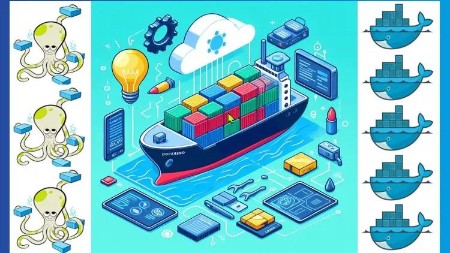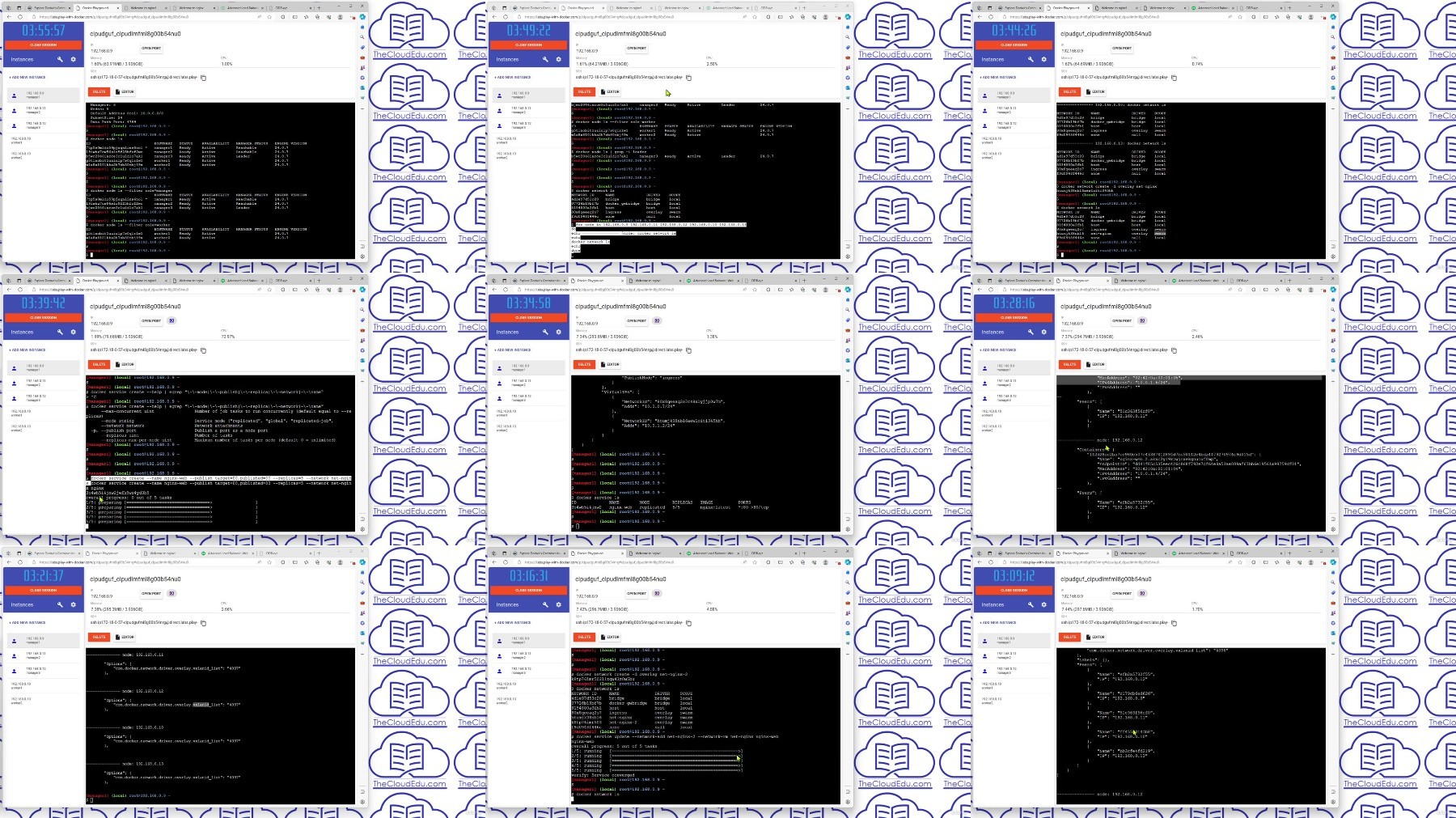The Ultimate Docker Fundamentals

The Ultimate Docker Fundamentals
Published 1/2024
Duration: 9h13m | .MP4 1280x720, 30 fps(r) | AAC, 44100 Hz, 2ch | 5.17 GB
Genre: eLearning | Language: English
Docker Fundamentals introduces containerization basics, Docker concepts, image creation, networking, and orchestration.
What you'll learn
Understanding Docker Concepts: Containerization, images, containers, Docker Engine, registries, and the Docker ecosystem.
Hands-On Docker Usage: Practical online labs, hands-on experience with Docker. Create, manage, and deploy containers using Dockerfile.
Docker Orchestration: Explore Docker orchestration tools like Docker Compose and Docker Swarm. Learn how to deploy, manage scalable and resilient applications.
Best Practices and Troubleshooting: Best practices for Docker implementation, security measures, optimization techniques, and troubleshooting.
All labs will be online on a free tier.
Requirements
Basic Computer Skills: Familiarity with using the command line interface (CLI) in a terminal or shell environment. Understanding of Software Development Concepts: A foundational understanding of software development principles and workflows is beneficial but not always mandatory. Operating System Knowledge: Basic knowledge of operating systems (such as Windows, macOS, or Linux) to understand how Docker interacts with the host OS. Internet Access: Access to the internet to download Docker, related resources, and course materials. Hardware Requirements: A computer or device capable of running a browser like Chrome, Edge, Firefox, Internet Explorer. This course is self-paced one and do not require extensive technical background knowledge but benefit from basic familiarity with software development and computing concepts.
Description
This class is crucial as it equips individuals with the foundational knowledge of Docker, enabling them to harness containerization's benefits. Students gain expertise in creating, managing, and orchestrating containers, streamlining deployments, optimizing resource utilization, and ensuring consistent, scalable applications across diverse environments.
All hands-on labs are online in a free tier at no cost to the students (No Credit Card needed)
. The skills acquired are vital for modern software development, offering agility, scalability, and efficiency in application deployment and management
The Docker Fundamentals class covers a comprehensive range of essential Docker concepts and tools, providing a deep understanding of containerization and orchestration. Here's a detailed breakdown:
Docker Container
: Understanding containerization principles, students learn to create, manage, and optimize Docker containers. They explore container lifecycles, customization, and best practices for efficient utilization.
Docker Registries / Images (Pull & Push)
: Students delve into Docker image creation with Dockerfile, optimization, and management. They gain hands-on experience building custom images using Dockerfiles and Docker Hub.
Docker Compose
: Exploring Docker Compose, students discover the power of defining and managing multi-container applications using YAML files. They learn to orchestrate interconnected services effortlessly.
Docker Swarm
: Introduction to Docker Swarm for container orchestration. Students dive into Swarm mode, learning to manage clusters, deploy services at scale, and ensure fault tolerance for distributed applications.
Docker Volumes
: Understanding Docker volumes and data management. Students explore persistent storage, managing data between containers and hosts, and leveraging volumes for data persistence.
Docker Machine
: Exploring Docker Machine for provisioning Docker hosts across various platforms. Students learn to set up and manage Docker environments with ease.
Docker Networks
: Understanding Docker networking models and concepts. Students gain insights into container communication, network isolation, and creating efficient networking configurations.
Upon completion, students possess a robust skill set, capable of proficiently leveraging Docker tools to create, manage, and orchestrate containers, design multi-service applications, implement persistent storage solutions, manage networks, and optimize Docker environments for streamlined and scalable application deployment.
The audience for this Docker Fundamentals class includes:
Developers
: Those aiming to master containerization for efficient application development and deployment.
DevOps Engineers
: Professionals seeking orchestration skills for managing containerized environments.
System Administrators
: Individuals responsible for infrastructure management, aiming to optimize container workflows.
Operations Teams
: Teams focusing on scalable deployments and fault-tolerant setups.
Technology Enthusiasts
: Individuals keen on modernizing workflows with Docker and containerization.
Enhancing Skills
: Adding Docker skills to one's repertoire can enhance career prospects and open doors to new opportunities in the rapidly evolving tech landscape.
Overall, Docker Fundamentals provide a foundational understanding crucial for modern software development practices, offering efficiency, scalability, and standardization in application deployment and management.
Who this course is for:
"The Ultimate Docker Fundamentals" is suitable for various individuals interested in containerization and Docker technology: Developers: Those looking to understand containerization and how Docker can streamline the development and deployment of applications. DevOps Engineers: Professionals aiming to learn container orchestration, streamline workflows, and optimize infrastructure management using Docker. System Administrators: Individuals responsible for managing infrastructure and interested in utilizing Docker for efficient deployment and management of applications. Operations Teams: Teams focused on deploying and managing applications at scale, seeking to leverage Docker for improved operations and scalability. Technology Enthusiasts: Individuals intrigued by modern software development technologies and keen to explore Docker's capabilities. While the course is designed for beginners, it provides a solid foundation in Docker concepts and practical usage. It's ideal for those new to Docker seeking to gain knowledge and hands-on experience in containerization and Docker's ecosystem.
More Info

https://rapidgator.net/file/4d08e25a5705ff3e99cabebd3d172ef4/Udemy.The.Ultimate.Docker.Fundamentals.BOOKWARE-LBWx.part1.rar
https://rapidgator.net/file/b1f9958dcca12dcc6ffc8f3155b76cbe/Udemy.The.Ultimate.Docker.Fundamentals.BOOKWARE-LBWx.part2.rar
https://rapidgator.net/file/e003888302344247cec190869f6546e8/Udemy.The.Ultimate.Docker.Fundamentals.BOOKWARE-LBWx.part3.rar
https://filestore.me/mgu68cky533f/Udemy.The.Ultimate.Docker.Fundamentals.BOOKWARE-LBWx.part1.rar
https://filestore.me/tm6t6g1v0dla/Udemy.The.Ultimate.Docker.Fundamentals.BOOKWARE-LBWx.part2.rar
https://filestore.me/yc7f3e9xsech/Udemy.The.Ultimate.Docker.Fundamentals.BOOKWARE-LBWx.part3.rar
What you'll learn
Understanding Docker Concepts: Containerization, images, containers, Docker Engine, registries, and the Docker ecosystem.
Hands-On Docker Usage: Practical online labs, hands-on experience with Docker. Create, manage, and deploy containers using Dockerfile.
Docker Orchestration: Explore Docker orchestration tools like Docker Compose and Docker Swarm. Learn how to deploy, manage scalable and resilient applications.
Best Practices and Troubleshooting: Best practices for Docker implementation, security measures, optimization techniques, and troubleshooting.
All labs will be online on a free tier.
Requirements
Basic Computer Skills: Familiarity with using the command line interface (CLI) in a terminal or shell environment. Understanding of Software Development Concepts: A foundational understanding of software development principles and workflows is beneficial but not always mandatory. Operating System Knowledge: Basic knowledge of operating systems (such as Windows, macOS, or Linux) to understand how Docker interacts with the host OS. Internet Access: Access to the internet to download Docker, related resources, and course materials. Hardware Requirements: A computer or device capable of running a browser like Chrome, Edge, Firefox, Internet Explorer. This course is self-paced one and do not require extensive technical background knowledge but benefit from basic familiarity with software development and computing concepts.
Description
This class is crucial as it equips individuals with the foundational knowledge of Docker, enabling them to harness containerization's benefits. Students gain expertise in creating, managing, and orchestrating containers, streamlining deployments, optimizing resource utilization, and ensuring consistent, scalable applications across diverse environments.
All hands-on labs are online in a free tier at no cost to the students (No Credit Card needed)
. The skills acquired are vital for modern software development, offering agility, scalability, and efficiency in application deployment and management
The Docker Fundamentals class covers a comprehensive range of essential Docker concepts and tools, providing a deep understanding of containerization and orchestration. Here's a detailed breakdown:
Docker Container
: Understanding containerization principles, students learn to create, manage, and optimize Docker containers. They explore container lifecycles, customization, and best practices for efficient utilization.
Docker Registries / Images (Pull & Push)
: Students delve into Docker image creation with Dockerfile, optimization, and management. They gain hands-on experience building custom images using Dockerfiles and Docker Hub.
Docker Compose
: Exploring Docker Compose, students discover the power of defining and managing multi-container applications using YAML files. They learn to orchestrate interconnected services effortlessly.
Docker Swarm
: Introduction to Docker Swarm for container orchestration. Students dive into Swarm mode, learning to manage clusters, deploy services at scale, and ensure fault tolerance for distributed applications.
Docker Volumes
: Understanding Docker volumes and data management. Students explore persistent storage, managing data between containers and hosts, and leveraging volumes for data persistence.
Docker Machine
: Exploring Docker Machine for provisioning Docker hosts across various platforms. Students learn to set up and manage Docker environments with ease.
Docker Networks
: Understanding Docker networking models and concepts. Students gain insights into container communication, network isolation, and creating efficient networking configurations.
Upon completion, students possess a robust skill set, capable of proficiently leveraging Docker tools to create, manage, and orchestrate containers, design multi-service applications, implement persistent storage solutions, manage networks, and optimize Docker environments for streamlined and scalable application deployment.
The audience for this Docker Fundamentals class includes:
Developers
: Those aiming to master containerization for efficient application development and deployment.
DevOps Engineers
: Professionals seeking orchestration skills for managing containerized environments.
System Administrators
: Individuals responsible for infrastructure management, aiming to optimize container workflows.
Operations Teams
: Teams focusing on scalable deployments and fault-tolerant setups.
Technology Enthusiasts
: Individuals keen on modernizing workflows with Docker and containerization.
Enhancing Skills
: Adding Docker skills to one's repertoire can enhance career prospects and open doors to new opportunities in the rapidly evolving tech landscape.
Overall, Docker Fundamentals provide a foundational understanding crucial for modern software development practices, offering efficiency, scalability, and standardization in application deployment and management.
Who this course is for:
"The Ultimate Docker Fundamentals" is suitable for various individuals interested in containerization and Docker technology: Developers: Those looking to understand containerization and how Docker can streamline the development and deployment of applications. DevOps Engineers: Professionals aiming to learn container orchestration, streamline workflows, and optimize infrastructure management using Docker. System Administrators: Individuals responsible for managing infrastructure and interested in utilizing Docker for efficient deployment and management of applications. Operations Teams: Teams focused on deploying and managing applications at scale, seeking to leverage Docker for improved operations and scalability. Technology Enthusiasts: Individuals intrigued by modern software development technologies and keen to explore Docker's capabilities. While the course is designed for beginners, it provides a solid foundation in Docker concepts and practical usage. It's ideal for those new to Docker seeking to gain knowledge and hands-on experience in containerization and Docker's ecosystem.
More Info

https://rapidgator.net/file/4d08e25a5705ff3e99cabebd3d172ef4/Udemy.The.Ultimate.Docker.Fundamentals.BOOKWARE-LBWx.part1.rar
https://rapidgator.net/file/b1f9958dcca12dcc6ffc8f3155b76cbe/Udemy.The.Ultimate.Docker.Fundamentals.BOOKWARE-LBWx.part2.rar
https://rapidgator.net/file/e003888302344247cec190869f6546e8/Udemy.The.Ultimate.Docker.Fundamentals.BOOKWARE-LBWx.part3.rar
https://filestore.me/mgu68cky533f/Udemy.The.Ultimate.Docker.Fundamentals.BOOKWARE-LBWx.part1.rar
https://filestore.me/tm6t6g1v0dla/Udemy.The.Ultimate.Docker.Fundamentals.BOOKWARE-LBWx.part2.rar
https://filestore.me/yc7f3e9xsech/Udemy.The.Ultimate.Docker.Fundamentals.BOOKWARE-LBWx.part3.rar
